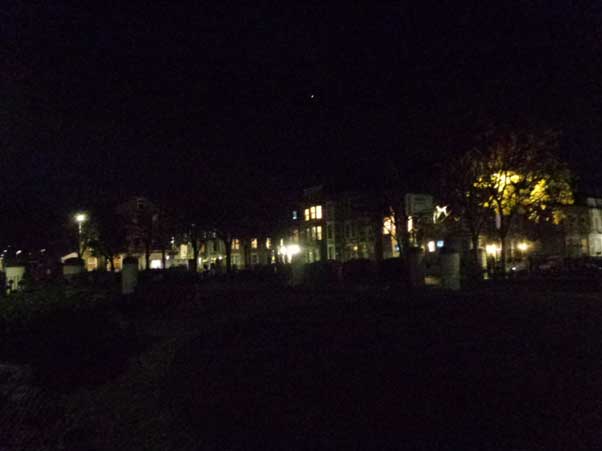
Bombed out, 5.30am, November’s night-wandering insomniac:
this place embodies an inner state.
Is there some post-war hope? I doubt it.
The silent streets pass on.
Glide, shift on, through the castellations of high Victorian terraces between wastelands and shutters,
echoing vanished cities of the 50s, lodged out of mind . . . impoverished tree-lined squares, autumn swings, bead curtains across crumbling bay windows, glowing, warm,
Ban the Bomb . . .
Here, decades on,
the crassness of contemporary vehicles concealed . . . nocturne . . . the crooked bins and cobbled alleys appear gaslit, seriously suggesting attack by razor.
Haunted corners and gap-toothed fences abruptly diluted by parked-up campers.
Left and right, backtracking, another angle, another shift, trying to lose direction, keep away from the roar, remember the grail, forget the grail . . .
_________________
Through tall grasses at the stub of a street, the roar enlarges . . . fathomless edge to this abandoned planet.
But the towering tide wished for, advancing to obliterate, is not here. The sea is flat.
There are no waves, the sound comes from within – an endless subliminal rage,
fury smothered in conscience, the mud of routine, the silt of habit,
or by the brief glitter of new channels, willingly beguiled.
Personal and planetary, political, societal, accusatory; against tact, against compromise, against the inner deaths and personal prisons we tirelessly remake . . . all the nails of the human condition are hammered home.
_________________
Facing the void, the old facades grow taller in defiance or expectation and are interspersed with newer blocks, apartments trying to believe in somewhere else, or that the future will prove them right.
Nearby must live the old sea captain we once met in summer daylight, calmly settled on his veranda, likely rented, probably resting on tolerance. Whether he’d ever been to sea was hard to tell, but he had the pipe and the crested cap and was keen – doing up his shirt – to be recorded. Was that his image? Was that how he survived? A ghost behind a curtain of sea mist or pipe smoke.
But that was afternoon, and my daughter – smiling, half-embarrassed – was by my side. This is solitary night, where the rare lighted windows of other restless loners, secret sharers of the roar, float high in space above the frontier of the promenade.
Or grounded amongst the red flick of burglar alarms, these isolated rooms move into negative florescence, kitchen clocks and coffee machines. Angst becomes ghastly white. Grief a vacuum.
To be more prosaic, some of these questing, pacing or absent figures must be early risers or workers. Or determined losers – whose failure is the missing success which might have saved us.
Between these human cells are other impassive displays:
angular picnic invitations concrete under expectant lamps.
Fairy lights which burst and fade to a background of drapery
– advents of Christmas? or are they always here:
Reassuring dells of weary, eternal festivity.
_________________
Side-shoved by the wind on this endless prom, reaching wide beneath low cliffs, the breezy semis recede above, lost in the night and grass without colour, only texture.
Their gardens wait – territories guarded by the characteristic stones beloved of walls around here: whispering knights[i], frozen warriors, melted chess pieces after the blast.
I know this long prom’s aim, all the way from Happy Mount, past book stalls and the Midland Hotel, Pleasureland, Aldi and the Old Battery – not forgetting the clock tower whose four faces offer four different times, all correct twice a day.
I know its final aim from previous daylights.
The ancient maritime village left behind, its graveyard above the ocean, a rural headland with grave holes carved for disarticulated saints perhaps
and a crown of trees – to half hide the nuclear mess beyond, those two ominous illuminated blocks . . .
while distant across the interplanetary rift of drowning tides,
the red lights of Barrow are about to sink.
Wide, dark and sinuous, this tenuous fringe – path, railings, sea defences – draws a submarine future between silent bedrooms and the elemental roar.
But a shuttle craft is in pursuit, its flashing lights and whirring brushes bringing me back to earth. The lit cab above; the driver’s newspaper . . . what a strange vigil. Scouring the only part of town which doesn’t need it.
Is there some post-war hope?
I don’t think so
I’m not sure
Perhaps.
Lawrence Freiesleben
[i] https://en.wikipedia.org/wiki/Rollright_Stones
.
